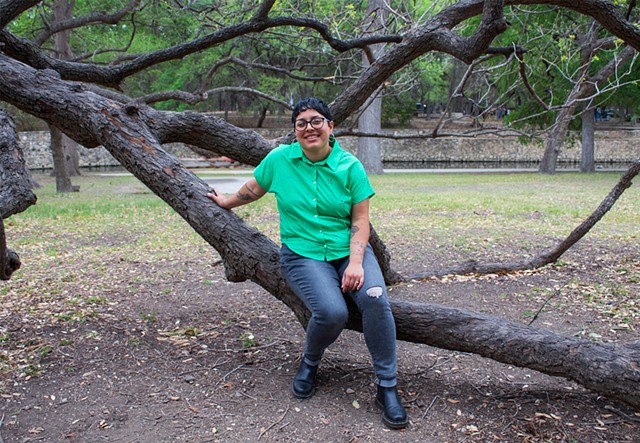ABOUT

Photo credit Monica Saldana.
Suzy González is an artist, educator, writer, self-publisher, curator, and organizer. She is an Assistant Professor & the Program Head of the Visual and New Media Arts Program at Our Lady of the Lake University. She is a current public artist in residence with Austin Art in Public Places at the Austin History Center. She has had solo exhibits at San Antonio's Central Library, Austin's Central Library, Galería E.V.A., Spellerberg Projects, Presa House Gallery, Hello Studio, Palo Alto College, and two-person exhibits at Museo Eduardo Carrillo, Texas A&M University Corpus Christi, and the University of Connecticut. She has created public art with Rochester Contemporary Art Center (NY), Texas A&M-San Antonio, the City of Roswell, GA, the City of Logan, UT, the City of Pasadena, TX, San Antonio Museum of Art, Centro San Antonio, the City of San Marcos, TX, the City of San Antonio, TX, and the San Antonio Street Art Initiative. She has attended residencies at Vermont Studio Center (VT), the Trelex Residency (Peru), The Wassaic Residency (NY), Starry Night Residency (NM), the Studios at MASS MoCA (MA), and Hello Studio (TX). Suzy publishes Xicana Vegan zine, co-organizes the San Anto Zine Fest, and is a part of Dos Xicanx, Breathe Collective, and the Water Writers collective. She has received artist grants from the City of San Antonio, Luminaria, VegFund, the Culture & Animals Foundation, the National Association of Latino Arts and Culture, and the Rhode Island School of Design. She's an alum of the National Association of Latino Arts and Cultures Leadership Institute, the Intercultural Leadership Institute, and served as a mentor for the New York Foundation for the Arts Immigrant Artist Mentoring Program. Suzy earned her MFA from the Rhode Island School of Design and her BFA from Texas State University.
My enthusiasm towards decolonizing consumption and art creation is intertwined with remembering the lessons that the earth has to teach us. I work with natural plant materials like corn husks in conjunction with manipulated art supplies to consider identity, mixedness, and resistance. The corn husks represent the skin of the figures, recalling Mesoamerican beliefs that our very beings are created from maíz. This material use works to dismantle folk and fine art hierarchies. I call these “mestizx media” works, reclaiming the “mestizo” colonial caste label. I define mestizx media as when materials originate from the region(s) of the artist’s ancestors. Accepting mixedness is also about embracing queerness and the fluid nature of identities that reject constructed binaries. My public artwork has included themes of celebrating contemporary artists and activists, histories of the land, native plants and animals, and concepts of love and solidarity. My work serves to work through my own intersections and to strive for intercultural conversations in my community. This, I hope, will open doors to compassion and healing in this world of destruction.